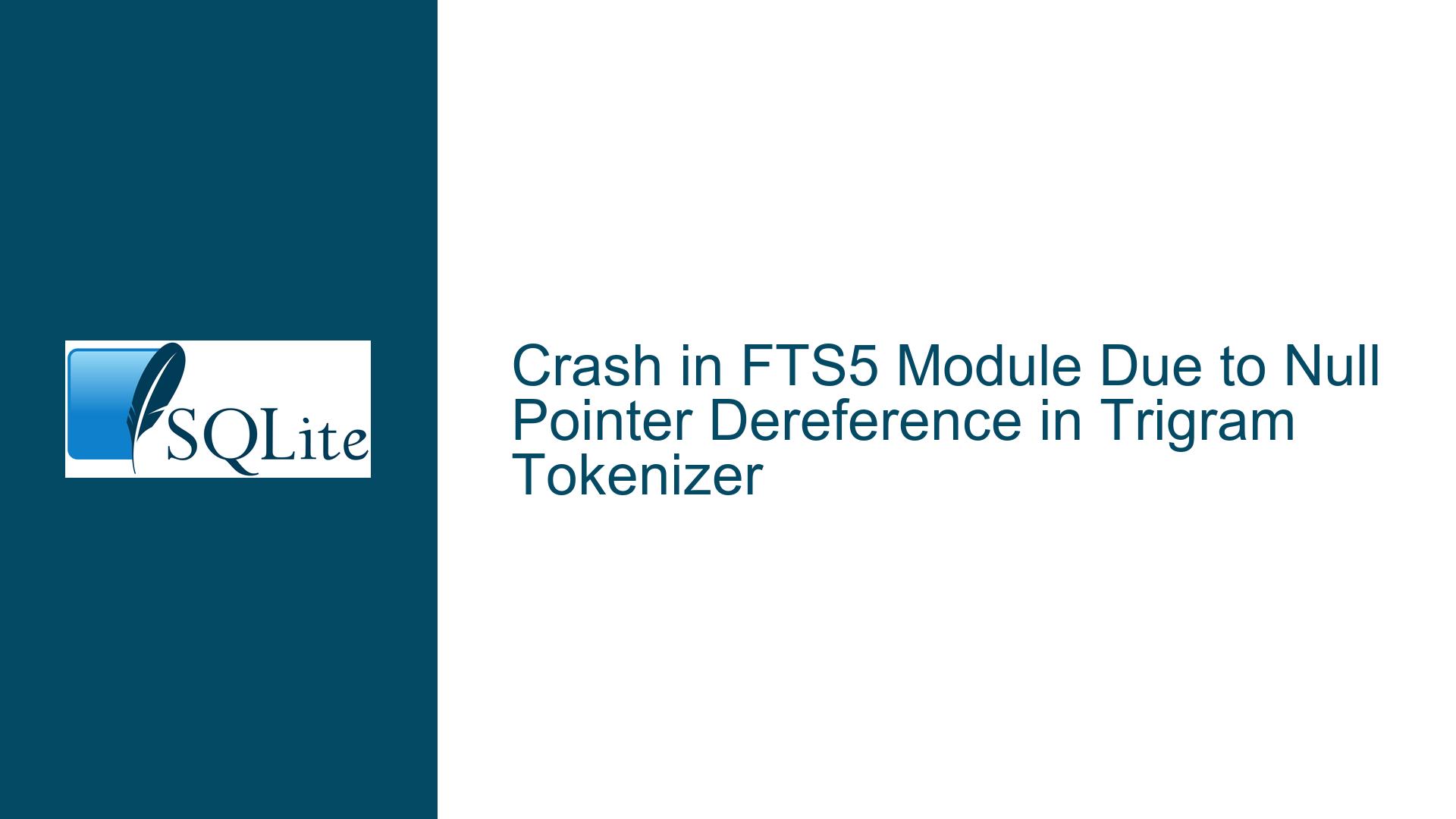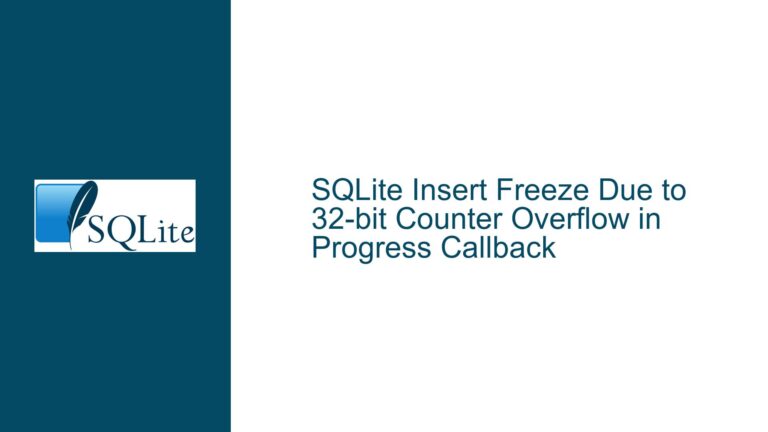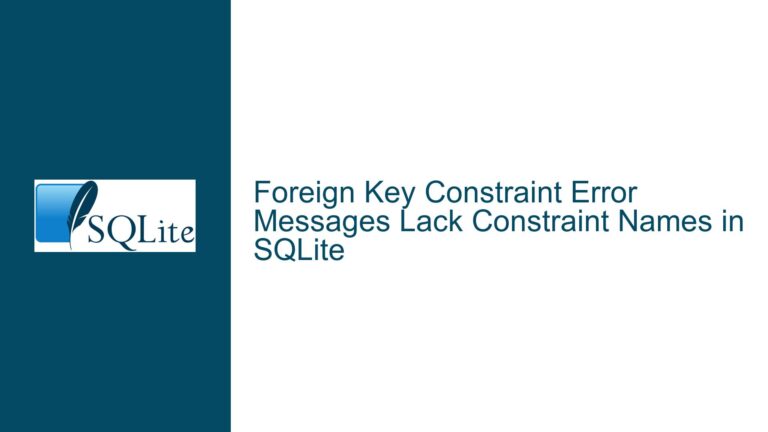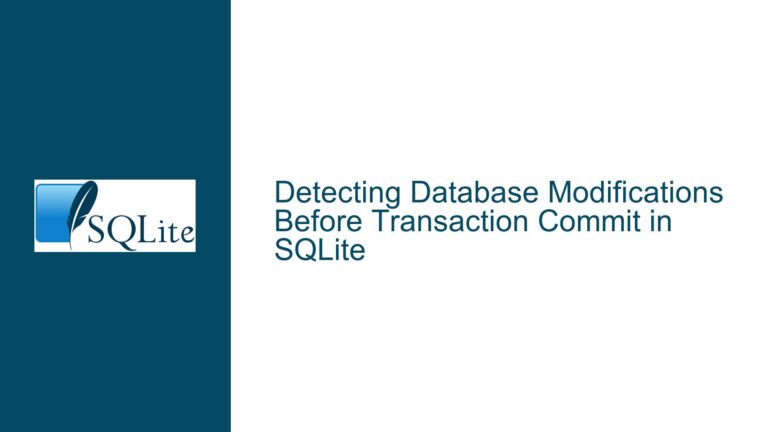Crash in FTS5 Module Due to Null Pointer Dereference in Trigram Tokenizer
Issue Overview: Null Pointer Dereference in FTS5 Trigram Tokenizer
The core issue revolves around a crash occurring in the FTS5 module of SQLite, specifically within the trigram tokenizer. This crash manifests when creating a virtual table using the FTS5 module with certain tokenizer options. The problematic options are case_sensitive and remove_diacritics, which are used without providing the required arguments. The crash is a result of a null pointer dereference, which happens because the tokenizer logic does not validate the presence of the necessary arguments before attempting to access them.
When a virtual table is created using the FTS5 module with the tokenize='trigram case_sensitive' or tokenize='trigram remove_diacritics' options, the tokenizer expects a "1" or "0" argument to follow these options. However, the current implementation fails to check whether these arguments are present, leading to an attempt to access a null pointer. This results in a crash, which has been observed in both the AIxCC competition environment and the Windows sqlite3.exe tool.
The issue is particularly critical because it affects the stability of the SQLite database when using the FTS5 module with the trigram tokenizer. The FTS5 module is designed to provide full-text search capabilities, and the trigram tokenizer is one of the key components that enable advanced text search functionalities. The crash not only disrupts the operation of the database but also poses a risk of data corruption if the crash occurs during a critical operation.
The problem was identified and reported during the AIxCC competition, where it was observed that the crash could be reliably triggered by the specific commands mentioned. The issue was subsequently confirmed by other users, including those using the Windows sqlite3.exe tool. The SQLite development team addressed the issue in a later release, but understanding the root cause and the potential impact is crucial for developers who might be using older versions or who need to implement similar tokenizer logic in their applications.
Possible Causes: Missing Argument Validation in Tokenizer Logic
The primary cause of the crash is the lack of proper argument validation in the trigram tokenizer logic within the FTS5 module. The tokenizer is designed to accept options such as case_sensitive and remove_diacritics, which are intended to modify the behavior of the tokenizer. These options are expected to be followed by a "1" or "0" to indicate whether the feature should be enabled or disabled. However, the current implementation does not verify that these arguments are present before attempting to access them.
In the context of the FTS5 module, the tokenizer logic is responsible for parsing the tokenizer options provided during the creation of a virtual table. When the tokenize='trigram case_sensitive' or tokenize='trigram remove_diacritics' options are used, the tokenizer logic attempts to access the value associated with these options. Since the value is not provided, the logic ends up dereferencing a null pointer, leading to a crash.
The issue is compounded by the fact that the tokenizer logic does not enforce a strict requirement for the number of arguments. In a well-designed tokenizer, the number of arguments should be validated to ensure that all required options have corresponding values. For example, if an option like case_sensitive is provided, the tokenizer should check that a value (either "1" or "0") is also provided. This validation is crucial to prevent null pointer dereferences and other potential issues.
The problem is similar to issues that have been observed in other tokenizers, such as the unicode61 and ascii tokenizers. In these tokenizers, the logic typically checks that the number of arguments is a multiple of two, ensuring that each option has a corresponding value. This approach prevents the tokenizer from attempting to access non-existent arguments and avoids null pointer dereferences. The trigram tokenizer, however, does not implement this validation, leading to the observed crash.
Another potential cause of the issue is the lack of proper error handling in the tokenizer logic. When the tokenizer encounters an invalid or missing argument, it should return an error code rather than attempting to proceed with the operation. This would allow the calling code to handle the error gracefully and avoid a crash. However, in the current implementation, the tokenizer logic does not return an error code when it encounters a missing argument, leading to the null pointer dereference.
Troubleshooting Steps, Solutions & Fixes: Implementing Argument Validation and Error Handling
To address the issue, it is necessary to implement proper argument validation and error handling in the trigram tokenizer logic. This involves modifying the tokenizer logic to check that all required arguments are present before attempting to access them. Additionally, the tokenizer should return an appropriate error code when it encounters an invalid or missing argument, allowing the calling code to handle the error gracefully.
The first step in troubleshooting the issue is to identify the specific point in the tokenizer logic where the null pointer dereference occurs. This can be done by examining the code that processes the tokenizer options and determining where the missing argument validation should be added. Once the problematic code has been identified, the next step is to implement the necessary validation checks.
One approach to implementing the validation checks is to ensure that the number of arguments is a multiple of two. This ensures that each option has a corresponding value, preventing the tokenizer from attempting to access non-existent arguments. The following code snippet demonstrates how this validation can be implemented:
if (nArg % 2 != 0) {
rc = SQLITE_ERROR;
} else {
// Proceed with the tokenizer logic
}
In this code, nArg represents the number of arguments passed to the tokenizer. If the number of arguments is not a multiple of two, the tokenizer returns an error code (SQLITE_ERROR), indicating that the arguments are invalid. This prevents the tokenizer from attempting to access non-existent arguments and avoids the null pointer dereference.
Another important aspect of the solution is to ensure that the tokenizer logic returns an appropriate error code when it encounters an invalid or missing argument. This allows the calling code to handle the error gracefully and avoid a crash. The following code snippet demonstrates how this can be implemented:
if (missing_argument) {
rc = SQLITE_ERROR;
} else {
// Proceed with the tokenizer logic
}
In this code, missing_argument is a boolean value that indicates whether a required argument is missing. If a required argument is missing, the tokenizer returns an error code (SQLITE_ERROR), indicating that the arguments are invalid. This prevents the tokenizer from attempting to access non-existent arguments and avoids the null pointer dereference.
In addition to implementing the necessary validation checks and error handling, it is also important to update the documentation for the FTS5 module to clearly indicate the requirements for the tokenizer options. This includes specifying that options like case_sensitive and remove_diacritics must be followed by a "1" or "0" to indicate whether the feature should be enabled or disabled. This helps prevent users from inadvertently providing invalid arguments and encountering the crash.
Finally, it is important to test the updated tokenizer logic to ensure that it correctly handles invalid or missing arguments and does not result in a crash. This can be done by creating test cases that cover various scenarios, including cases where the arguments are missing or invalid. The following code snippet demonstrates how such a test case can be implemented:
-- Test case for missing argument
CREATE VIRTUAL TABLE t1 USING fts5(s, tokenize='trigram case_sensitive');
-- Expected result: Error message indicating invalid arguments
-- Test case for valid arguments
CREATE VIRTUAL TABLE t2 USING fts5(s, tokenize='trigram case_sensitive 1');
-- Expected result: Table created successfully
In this test case, the first command attempts to create a virtual table with a missing argument, which should result in an error message indicating that the arguments are invalid. The second command attempts to create a virtual table with valid arguments, which should result in the table being created successfully. By running these test cases, developers can verify that the updated tokenizer logic correctly handles invalid or missing arguments and does not result in a crash.
In conclusion, the crash in the FTS5 module due to a null pointer dereference in the trigram tokenizer is a critical issue that can be addressed by implementing proper argument validation and error handling. By ensuring that the tokenizer logic checks for the presence of required arguments and returns an appropriate error code when it encounters invalid or missing arguments, developers can prevent the crash and ensure the stability of the SQLite database. Additionally, updating the documentation and testing the updated tokenizer logic are important steps in ensuring that the issue is fully resolved.






